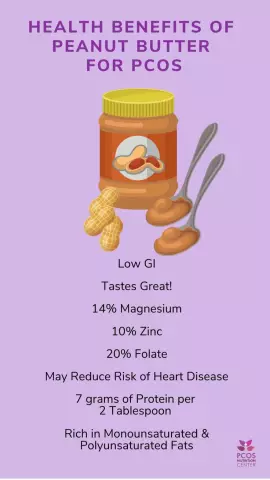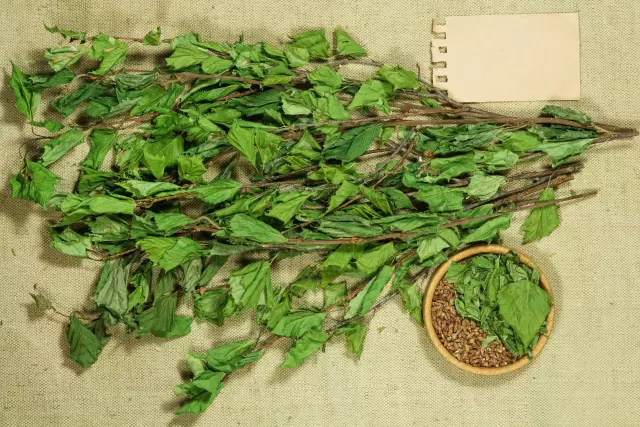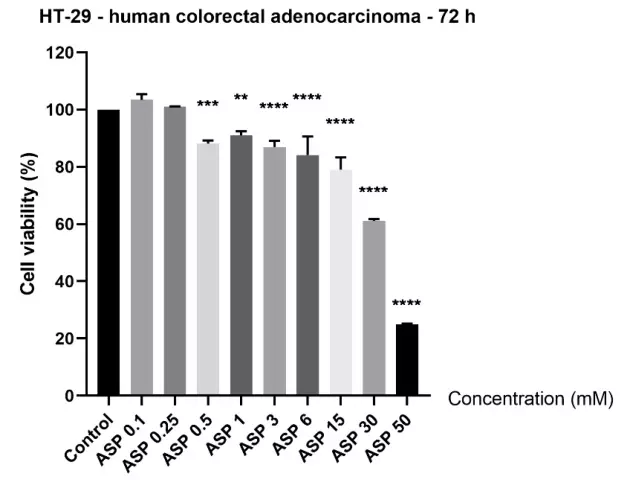- Author Rachel Wainwright [email protected].
- Public 2023-12-15 07:39.
- Last modified 2025-11-02 20:14.
Peanut butter
Description of peanut butter

Peanut butter is a valuable dietary herbal product that competes in energy and nutritional value with cheese and meat. It is obtained from the fruit of the peanut ("ground nut", "Chinese pistachio" or "Chinese nut"). It was first made in the early nineteenth century in America, after which the oil gained wide popularity throughout the world.
There are three main types of peanut butter:
- Unrefined, brick-brown oil with a pleasant and rich peanut flavor, produced in Asian countries;
- Refined non-deodorized and deodorized oil, popular in America and Europe. These oils are usually light yellow in color with a mild flavor and aroma.
The greatest nutritional value is possessed by "live" oil, made without the use of extraction by means of cold pressing, and for medicinal purposes it is preferable to take this type of oil.
Peanut Butter Composition
The excellent taste and high nutritional value of peanut butter are explained by its composition:
- Easily digestible fats;
- Indispensable amino acids. Polyunsaturated acids Omega-6 and Omega-9, which are contained in peanut oil, help to strengthen the immune system, normalize hormonal balance, and improve the functioning of the nervous and reproductive systems;
- Vitamins - B8, A, B1, E, D, B4, B2, B3, B5, B9. Antioxidant vitamins A and E help to improve the functioning of the organs of vision, and also have a strong anti-inflammatory, immunostimulating and wound-healing effect. Vitamin B4 prevents fatty liver infiltration and the development of gallstone disease. B vitamins contribute to healthy hair, nails and skin, as well as good eyesight and strong immunity;
- Macro - and microelements, including iodine, magnesium, potassium, calcium, copper, iron, phosphorus, zinc, cobalt and some others.
In addition, peanut butter contains a number of other elements (phospholipids, polyphenols, betaine, phytosterols), which have a beneficial effect on the functional state of the cardiovascular, nervous, immune and digestive systems of the body.
Benefits of peanut butter
Peanut oil has wound healing and pronounced antibacterial properties. Also, the distinctive features of peanut butter include the ability to:
- Improve physical activity and muscle tone;
- Reduce blood cholesterol;
- Recover strength after exertion or long-term illness;
- Improve sleep quality;
- Stimulate the natural production of collagen;
- Prevent diabetes mellitus;
- Improve liver function;
- Lose excess weight.
In folk medicine, peanut butter is often used externally to treat eczema, difficult-to-heal and festering wounds, exudative diathesis and herpes.
The benefits of peanut butter
Many studies have confirmed the benefits of peanut butter in the treatment and prevention of cardiovascular disease. It is especially effective for ischemia and circulatory disorders associated with blood clots.
In folk medicine, peanut oil, along with pumpkin seed oil, has long been used as an effective choleretic agent. It stimulates the processes of bile secretion and bile formation, helps to restore the cellular structure of the liver and prevent inflammatory processes in the gallbladder, liver and biliary tract.
The benefits of peanut butter in diabetes mellitus and blood diseases such as hemophilia, hemorrhagic diathesis, anemia have been proven. It will also be useful for:
- Depression, increased fatigue, insomnia, irritability and apathy;
- Kidney disease;
- Erectile dysfunction in men;
- Diseases of the organs of vision, since it reduces the risk of developing glaucoma, "night blindness", cataracts, macular degeneration, diabetic retinopathy and conjunctivitis.
Peanut Butter Applications
The uses of peanut butter are very diverse. It is used in the confectionery, bakery and pharmaceutical industries, in cosmetology and home cooking, in the production of margarine and soap, and also for medicinal purposes.

In modern cooking, peanut butter is used in salad dressings, sauces, and desserts. Due to its high calorie content, it is suitable for the diet of athletes.
For the treatment and prevention of diseases of various body systems, it is recommended to take peanut butter one teaspoon three times a day.
The use of peanut butter in cosmetology
Thanks to saturated polyacids, "vitamins of youth" A and E, betaine and polyphenols, the use of peanut oil helps to nourish, soften and intensively moisturize the skin. At the same time, the oil is perfectly absorbed and gives the skin firmness and elasticity.
With regular use, peanut oil prevents premature aging of the skin and helps to quickly restore the protective functions of the epidermis.
It is used in the preparation of balms, lotions, creams and cosmetic creams for the care of aging, dry, sensitive and flaky skin, and is also found in shampoos and soaps.
The harm of peanut butter
Peanut butter can be harmful if you have a nut allergy, which should be identified before adding it to your daily diet. Also, you should not use it for individual intolerance to peanuts.
In addition, harm from peanut butter can occur against the background of bronchial asthma, joint diseases (gout, arthritis and arthrosis) and increased blood clotting. In these diseases, peanut butter should be used with caution.
Found a mistake in the text? Select it and press Ctrl + Enter.






